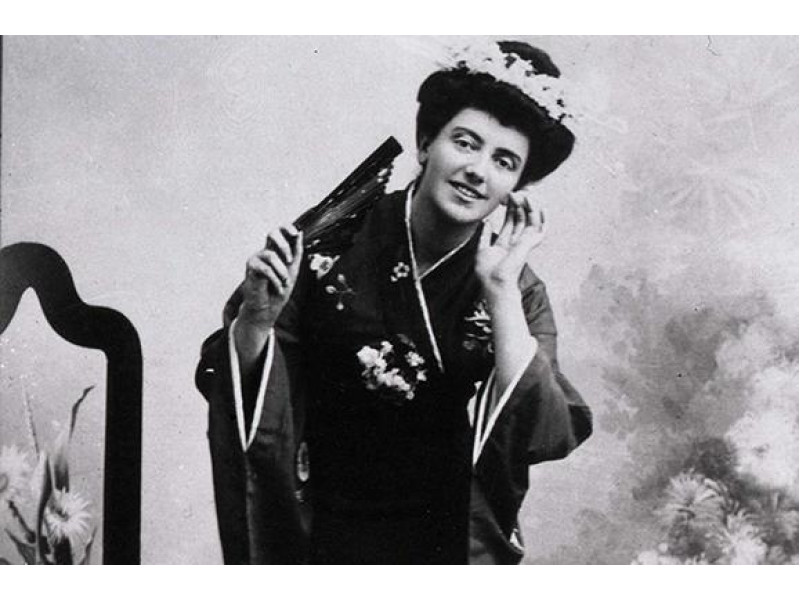"Wagner's prima donna" of the 20th century. The most outstanding singer in the world, who was one of the five most famous singers of her time, with whom the famous Fyodor Chaliapin, Enrico Caruso, Titto Ruffo aspired to perform on the same stage. A beautiful woman with enormous talent and an unsurpassed voice that captivated Europe and South America and remained in the memory of those who listened to her forever. "The most beautiful and charming Butterfly", "the unforgettable Aida", "the most charming Cio-Cio-San", "the unique Pebble", "the only Gioconda in the world", "the perfect Brunnhilde", "the most beautiful Solomiya", "the amazing Valkyrie", "the exceptional Lorelei"... A symbol of Ukrainian opera, Ukrainian music, Ukrainian art. All this is Solomiya Krushelnytska.
She spoke almost nothing about her life, left no stories about her family, career, personal life, or the people she worked with. A noble woman, she, while certainly aware of her immense value in world art, still remained a private person, but at the same time open to communication, a simple, warm-hearted person.
Her amazing beauty, wonderful manners, sophistication, elegance, sincerity and unsurpassed voice attracted the sympathy and affection of others to her, captivated their attention. And her life became an example of how a person can achieve everything in their career only thanks to their own talent, hard work, perseverance in achieving their goal and self-sacrifice in the name of art.
The birth of talent
Solomiya was born on September 23, 1872 in the Ternopil region into a large family of a clergyman who belonged to a noble Ukrainian family.
The girl's love for music and singing was evident in early childhood, and she also showed very good musical abilities. She enjoyed performing folk songs she heard from the peasants, learned to play the piano, and performed at concerts in the "Russian Conversation" choir, which her father conducted.
Her parents saw and supported their daughter's passion and her natural talents and successes. They helped Solomiya develop her talent in every way, creating the necessary atmosphere for this, organizing concerts and performances for guests at home. Later, they sent their daughter to Ternopil Gymnasium, which she graduated as an external student. It was there that Solomiya studied in a music group for gymnasium students and received the basics of musical literacy.
She continued her musical education at the Lviv Conservatory of the Galician Musical Society, where she first tried her hand at solo opera parts. Her wonderful voice did not go unnoticed by her teachers, who awarded her with a medal, and the beginning singer's diploma included the following entry: "She has all the makings to become an adornment of even a first-rate stage...".
Opera fame
The talented girl was noticed by opera luminaries, inviting her to the Polish opera house. But Solomiya, raised on folk songs, dreamed of developing the Ukrainian opera house, which did not yet exist at that time. Therefore, her choice fell on Italy, where she continued her studies. The full power of her powerful lyrical-dramatic soprano, whose range reached almost three octaves, was revealed here in full.
Within a year, a simple Ukrainian girl was singing triumphantly on the leading opera stages of Italy. The best theaters in Russia, Europe, and America were opening their doors to her.
But Solomiya, striving for self-improvement, went to Vienna, where she successfully mastered the most difficult parts for the voice in Wagner's operas "Tristan and Isolde", "Lohengrin", "Tannheuser", "Die Walküre", etc., receiving the title of "Wagnerian prima donna" of the 20th century.
And then the tours: Paris, Vienna, Milan, Warsaw, St. Petersburg, Odesa, Lviv, Rome, Naples… And everywhere she is in different performances, different images, with different opera parts. And everywhere – a wild success, crowds of enthusiastic fans. She was showered with flowers, given jewelry, painted portraits, dedicated poems and carried along with the crew in her arms. She became the owner of golden crowns and wreaths. The press all over the world wrote that her voice was the most beautiful of all that had ever been heard. She received offers from New York from the Metropolitan Opera and from London from Coven Garden. Famous opera composers are grateful to her for the masterfully performed main parts in their works. But even this wild fame did not make her dizzy. Solomiya did not look for patrons, did not turn to patrons, counting only on her own strength.
And there was something to count on, because her amazing voice, making her a universal singer, allowed her to perform any repertoire in eight languages – Italian, German, French, Spanish, English, Polish, Russian and, of course, Ukrainian, which she spoke fluently.
Poles and Italians considered Solomiya the national pride of their countries, but she herself always emphasized that she was Ukrainian. And, even at the very zenith of her world career and fame, she certainly remembered her native Motherland. She communicated with prominent Ukrainian cultural figures (Lesia Ukrainka, Ivan Franko, Olga Kobylyanska, Mykola Lysenko...). From year to year she visited Galicia, where she gladly gave concerts even in small villages. And always, in whatever country in the world Solomiya performed, she necessarily included Ukrainian folk songs in her performances - songs of her people.
One love for a lifetime
Like a true Ukrainian, Solomiya was very hospitable. Actors, composers, musicians, and theatergoers often visited her, and she happily organized real concerts for them.
Once, in the west of the Apennine Peninsula in the city of Viareggio, where S. Krushelnytska had lived since 1904, the mayor of this town, Alfredo Cesare Augusto Riccioni, came to visit the famous singer. A lawyer, aristocrat, erudite, and music connoisseur, he was delighted with the singer's voice, but he was most attracted to her beauty. The intelligent Italian also fell in love with Solomia, and after his long courtship, she returned his love. Finally, a man appeared in her life who was not just an admirer in love with her fame. There was a person nearby who understood her, respected her work, took care of her both at home, creating comfort and coziness, and during exhausting tours. Having married in July 1910 in Argentina, the lovers carried their feelings to the end of their lives, almost never parting. And only the absence of children saddened this union.
Twenty-six happy years of love were granted to them by fate.
End of career
Despite the fact that her brilliant career was in full swing, and theaters were competing to invite the famous prima donna on tour, Solomiya Krushelnytska decided to leave the opera stage, because she believed that the repertoire she performed was designed for young singers.
In 1915, she sang triumphantly for the last time on the most famous stage of the La Scala theater, and then, over the course of five years, gradually, as if saying goodbye to the big stage, she performed in the theaters of Lisbon, Monte Carlo, and Naples.
Since then, S. Krushelnytska has been performing in chamber concerts, performing in Europe, America, and Ukraine. Wanting to preserve her art, she records gramophone records, which only contain a small part of her repertoire. But, thanks to this, today we can hear the amazing voice of a wonderful Ukrainian woman.
After the death of her beloved husband, Solomiya Krushelnytska decided to return to Ukraine, and in August 1939 she moved to Lviv, where the beginning of World War II found her. And the great singer, whose name was pronounced with admiration and reverence by everyone involved in theater and music, had to survive by earning money by giving private singing lessons.
In 1944, Solomiya Amvrosiivna was invited to the Lviv State Conservatory named after M.V. Lysenko, offering the position of professor. A unique singer, she became an equally talented teacher, instilling in her students not just singing skills and voice technique, but a true vocal culture.
S. Krushelnytska's last performance in December 1949 took place at the Lviv Philharmonic. A gray-haired, thin elderly woman, who, leaning on a stick, entered the stage, suddenly sang in a strong, full-range voice. The same voice that conquered listeners all over the world. And, according to a long-standing tradition, at the end of the concert, native Ukrainian songs sounded, the love for which Solomiya had cherished in her soul since childhood.
Shortly before her death, her talent was finally recognized by the Soviet authorities with the title of Honored Artist of the Ukrainian SSR, which was surprising for those times, because, while she loved to sing folk songs, Solomiya Amvrosiyevna never sang about "the party, Lenin, the Komsomol."
Solomiya Krushelnytska passed away on November 16, 1952. She was buried in Lviv at the Lychakiv Cemetery. Her grave is crowned by the “Singing Orpheus,” a symbol of music, the very music that was the meaning of the entire life of the outstanding Ukrainian singer.
The memory of Solomiya Krushelnytska is engraved on memorial plaques, commemorative signs, anniversary coins, and stamps. Her name is given to the opera house and music school in Lviv, a music school in Ternopil, a school in her native village of Bila, and streets in various cities of Ukraine. She is dedicated to opera competitions and festivals. Her sculptural portraits are installed in the theaters of Lviv and Milan, her bust was unveiled in the Italian city of Torre del Lago, which is not far from the town of Viareggio, dear to the singer's heart, and a bronze monument in Ternopil.

















Write a comment